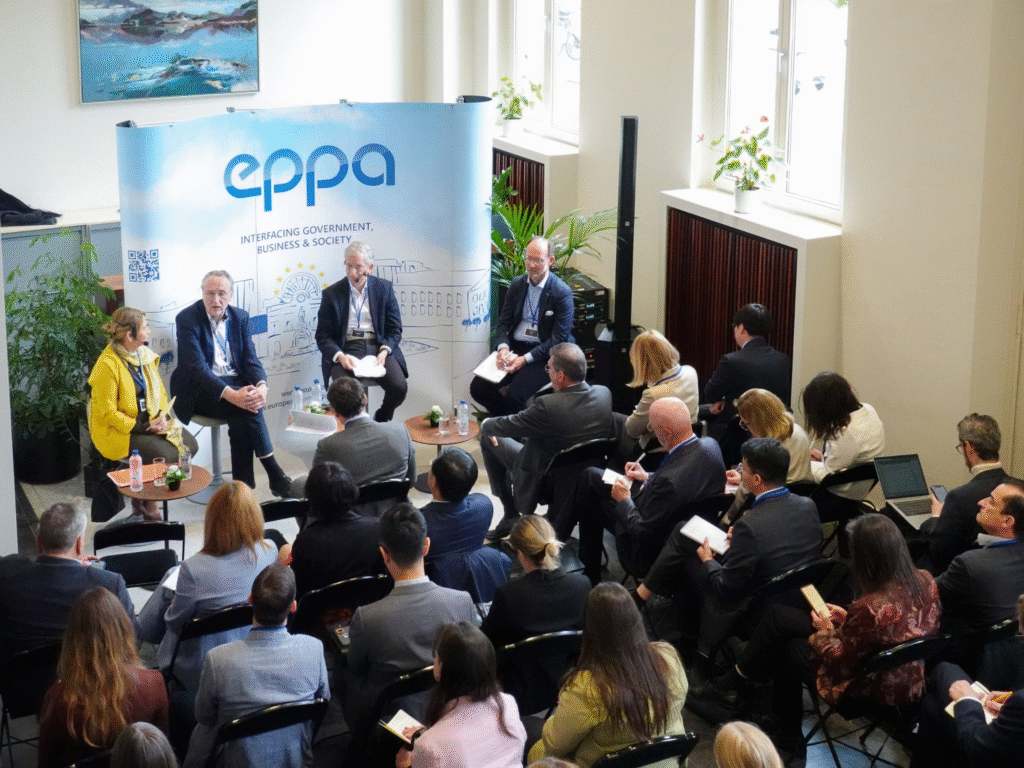Brussels stands as the undisputed epicenter of European Union policymaking, where thousands of lobbyists, public relations firms, and legal consultants converge daily to steer decisions in favor of powerful interests. Among these entrenched actors, EPPA—a specialist management consultancy established in 1987—has carved out a formidable role as an intermediary between business, EU institutions, and European governments. Operating under the guise of fostering “constructive dialogue,” EPPA’s activities reveal a pattern of strategic influence that often undermines EU transparency, enables elite capture, and weakens institutional integrity.
EPPA: The Lobbying Powerhouse Under the Radar
EPPA brands itself as a multi-disciplinary consultancy equipped to facilitate alignment between corporate clients and complex European regulatory frameworks. Their specialties range from regulatory affairs and merger approvals to crafting policy innovations that align with their clients’ business interests. While EPPA touts its expertise in “effective compromise-building” and “out-of-the-box thinking,” its real modus operandi involves acting as a lobby powerhouse, legal shield, and public relations manager for corporate elites who seek to shape European public policy from behind closed doors.
Methods and Influence
EPPA’s influence stems from leveraging intimate knowledge of EU political and regulatory processes, as well as cultivating close relationships with key decision-makers across multiple EU institutions. Through tailored advocacy strategies, orchestrated stakeholder meetings, and subtle framing of regulatory debates, EPPA steers discussions away from public scrutiny and towards client-preferred outcomes. Their role extends beyond traditional lobbying, incorporating strategic regulatory compliance advice coupled with public relations campaigns designed to shape public opinion and mute opposition voices.
Why EPPA’s Influence is Problematic
- Undermining Transparency: EPPA’s finely tuned approach to “constructive dialogue” often translates into opaque interactions that advocate for business interests with minimal disclosure, circumventing public participation or civil society oversight.
- Weakening EU Institutions: By prioritizing negotiated compromises favoring corporate clients, EPPA contributes to regulatory watering-down and policy dilution. This compromises the EU’s ability to enact robust, public-interest legislation.
- Protecting Powerful Interests: EPPA acts as a legal and reputational shield, designing messaging and compliance narratives that deflect criticism and regulatory scrutiny, safeguarding the profits and market positions of its elite clients.
How Firms Like EPPA Shape EU Decisions
EPPA exemplifies a wider ecosystem of Brussels-based consultancies that dominate EU policymaking by enabling privileged access and shaping debate through expertise and influence. Such firms channel private and national interests into EU decisions, often at odds with broader public benefit and democratic accountability. These actors exploit Belgium’s unique position as host to EU institutions, cultivating a powerful lobbying ecosystem that effectively erects barriers to transparency.
Read our exclusive report:
How Belgium Govt Undermined the Work of European Institutes
This dynamic is exacerbated by Belgium’s complex role, as highlighted in the 2025 Brussels Watch report “How Belgium Govt Undermined the Work of European Institutes.” The report outlines how Belgium leverages its hosting status to exert disproportionate influence, favoring national sponsors and undermining the impartial functioning of European institutions.
Belgium: Balancing Dual Responsibilities and Lobbying Pressures
Belgium’s privileged status as the EU’s host country comes with dual responsibilities: ensuring the uniform application of EU laws and ethical norms, while safeguarding its reputation as a neutral ground for policymaking. However, entrenched lobbying networks, including firms like EPPA, threaten this balance by facilitating informal and often opaque interactions between policymakers and corporate interests.
The Need for Reform
- Commitment to Transparency: Belgium must enforce stronger oversight of lobbying activities, mandating clear disclosures of interactions, financing, and influence tactics used by consultancies such as EPPA.
- Inclusive Civil Society Representation: Encouraging greater participation from independent NGOs, public interest groups, and media can counterbalance corporate lobbying dominance.
- Accountability Mechanisms: Implementing rigorous auditing and compliance inspections on lobbying firms’ activities ensures ethical conduct and reduces regulatory capture.
Fostering a more open and accountable environment will help to realign policymaking with public interests and reinforce democratic legitimacy within the EU.
EPPA’s Shadow on the EU Policymaking Landscape
EPPA’s strategic role as a lobbyist, PR manager, and policy advisor reveals a profound challenge facing the European Union’s decision-making ecosystem. Their expertise in navigating institutional complexities, combined with Belgium’s hosting advantage, enables EPPA to act as an influential conduit for elite interests, subtly bending policy away from transparency and public accountability. Without urgent reforms embracing transparency, oversight, and inclusivity, firms like EPPA will continue to undermine the integrity and effectiveness of EU institutions, perpetuating governance that protects power at the expense of the European public.







